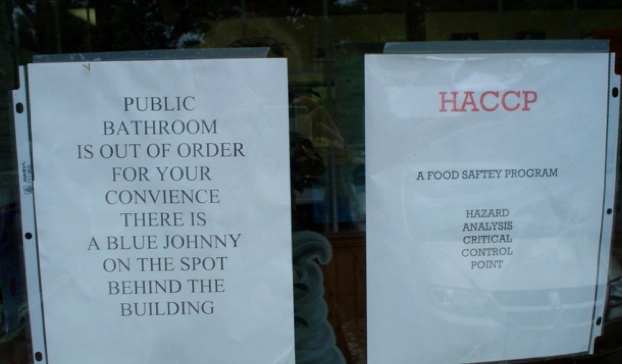In 2004, I spent a week at a cottage with a couple of my children in Eastern Ontario near Sandbanks Provincial Park on Lake Ontario. Lovely spot.
One rainy day, we toured around and ended up at a cheese shop. They produced the cheese in the factory at the back, and had a charming market outlet that  seemed to trap tourists like bees on sap.
seemed to trap tourists like bees on sap.
Upon entering the store, a sign declared, “HACCP – A food safety program; Hazard Analysis Critical Control Pont.” Cool. I asked one of the staff what it meant. She said she didn’t know. ??But beside the HACCP proclamation was a sign that read, “Public bathroom is out of order; for your convenience there is a blue Johnny on the spot behind the building.”?
No handwashing facilities or sanitizer. I watched people go to the porta potty and then come into the cheese shop and do what people do at quaint cheese shops: stick their unwashed hands into shared samples of curds (that’s one of my daughters looking disgusted in the middle, right, not because of the practice, but because I have to take pictures and be a food safety geek everywhere we go). HACCP really doesn’t mean much unless there is a culture of food safety amongst the employees and everyone involved in making a product, like cheese or deli meat.??
These public sampling stations can be cross-contamination nightmares. But the best hygiene won’t prevent food safety foul-ups when the product itself is contaminated.
Multiple sources are reporting tonight that Arizona and four other states reported cases of E. coli O157 in cheese products sold in Costco stores in October.
Twenty-five cases of Escherichia coli were confirmed by officials, 11 in Arizona lone, according to a statement issued Thursday by the Arizona Department of Health Services.
The outbreak appears to have been associated with cheese available for purchase at Costco "Cheese Road Shows," and Costco was working with state officials to remove the tainted product from its stores.
Early data from health officials suggests that Dutch-style Gouda cheese is the culprit. Costco is cooperating with the investigation: they have removed all suspect products from shelves and are notifying customers who purchased cheese from the road show.
A U.S. Food and Drug Administration press release states:]
• Bravo Farms Dutch Style Gouda cheese, (Costco item 40654) offered for sale and in cheese sampling events at Costco Wholesale Corporation (Costco) locations is preliminarily linked with an outbreak of E.coli O157:H7 infections.
• Consumers who have any of this cheese should not eat it. They should return the cheese to the place of purchase or dispose of it in a closed plastic bag and place in a sealed trash can to prevent people or animals, including wild animals, from eating it.
• Most people infected with E. coli O157:H7 develop diarrhea and abdominal cramps, but some illnesses may last longer and can be more severe. While most people recover within a week, some may develop a severe infection. Rarely, as  symptoms of diarrhea improve, a type of kidney failure called hemolytic uremic syndrome (HUS) can occur; this can happen at any age but is most common in children under 5 years old and in older adults. People with HUS should be hospitalized immediately, as their kidneys may stop working and they may be at risk for other serious health problems.
symptoms of diarrhea improve, a type of kidney failure called hemolytic uremic syndrome (HUS) can occur; this can happen at any age but is most common in children under 5 years old and in older adults. People with HUS should be hospitalized immediately, as their kidneys may stop working and they may be at risk for other serious health problems.
• As of Thursday, November 4, 2010, 25 persons infected with the outbreak strain of E. coli O157:H7have been reported from five states since mid-October. The number of ill persons identified in each state with this strain is as follows: AZ (11), CA (1), CO (8), NM (3) and NV (2). There have been 9 reported hospitalizations, 1 possible case of hemolytic uremic syndrome (HUS), and no deaths.
Costco may need to check its suppliers. Again.
 Starting November 2015, the agency began microbiological surveillance sampling and testing of cucumbers and hot peppers because these products have previously been involved in large-scale outbreaks, according to the FDA report. The outbreaks were linked to hospitalizations, and in the case of hot peppers, two deaths, according to the FDA.
Starting November 2015, the agency began microbiological surveillance sampling and testing of cucumbers and hot peppers because these products have previously been involved in large-scale outbreaks, according to the FDA report. The outbreaks were linked to hospitalizations, and in the case of hot peppers, two deaths, according to the FDA.
 seemed to trap tourists like bees on sap.
seemed to trap tourists like bees on sap. symptoms of diarrhea improve, a type of kidney failure called hemolytic uremic syndrome (HUS) can occur; this can happen at any age but is most common in children under 5 years old and in older adults. People with HUS should be hospitalized immediately, as their kidneys may stop working and they may be at risk for other serious health problems.
symptoms of diarrhea improve, a type of kidney failure called hemolytic uremic syndrome (HUS) can occur; this can happen at any age but is most common in children under 5 years old and in older adults. People with HUS should be hospitalized immediately, as their kidneys may stop working and they may be at risk for other serious health problems.